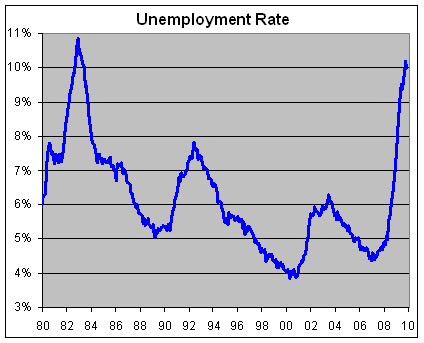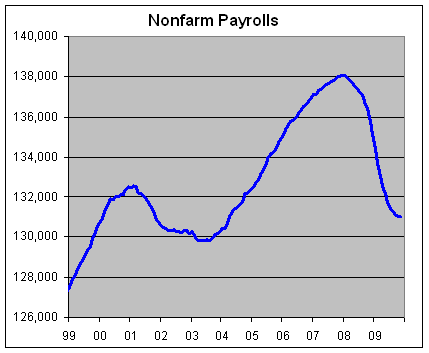-
Finally! Not Completely Awful News for Jobs
Posted by Eddy Elfenbein on December 4th, 2009 at 10:07 amThe unemployment rate dropped to 10% in November from 10.2% in October. To be very precise, the unemployment rate fell to 9.992%.
That’s good news but the economy is still losing jobs—only 11,000 jobs were lost last month. That’s a dramatic improvement over the data we’ve seen during the past two years. The Labor Department also revised the data higher for September and October.
Here’s a look at the unemployment rate:

Here’s a look at non-farm payrolls:

In less than two years, seven million jobs have been lost. -
Quote of the Day
Posted by Eddy Elfenbein on December 4th, 2009 at 9:48 amFrom Larry Ribstein: “For awhile I carried on an experiment of analyzing closely a mainstream media business commentator to see just how bad it is. The commentator is Gretchen Morgenson, and my findings, as set forth in this archive: very bad.”
-
Tim Sykes Rant
Posted by Eddy Elfenbein on December 3rd, 2009 at 2:27 pmI’m glad to see Tim Sykes come out of his shell to tell us what he really thinks.
-
Sign Up Today!
Posted by Eddy Elfenbein on December 2nd, 2009 at 3:28 pmSign up for the Wilmott-Taleb “Robust Risk Management” course in London just £1,999 (or £1,499 if you’re early). Sign Up Today!
-
The Stock Market Fails to Outperform the Stock Market
Posted by Eddy Elfenbein on December 2nd, 2009 at 2:52 pmFelix Salmon points to a study by Ken French and Eugene Fama showing that the returns of mutual funds are pretty evenly distributed. The tails are a bit fatter than the bell curve would suggest. The study also shows that fees basically eat up all the alpha. (This leads Matthew Yglesias to call the entire mutual fund industry “an elaborate fraud.”)
Felix writes:For the vast majority of actively managed funds, true α is probably negative; that is, the fund managers do not have enough skill to produce risk adjusted expected returns that cover their costs.
Personally, I’m happy with some negative alpha out there because it means more for me. However, this study doesn’t impress me much because it looks at the fund industry as a whole. What the study shows is that the stock market doesn’t outperform the stock market. I can live with that. What would be more interesting is to see if the small group of active managers with positive alpha continues to have positive alpha. That’s the key.
-
The World’s Tallest Buildings and Market Bubbles
Posted by Eddy Elfenbein on December 2nd, 2009 at 12:47 pm
Here’s a look at the relationship between the successive tallest buildings in the world and market bubbles. Via Tyler Cowen, I see that Ed Glaeser writes “Dubai now has the tallest building in the world, and 11 skyscrapers that are taller than any European building.” -
The Geeks Have Won
Posted by Eddy Elfenbein on December 2nd, 2009 at 12:31 pmThis is the kind of story the media loves to write:
Traditional floor trading “really is an alpha-male activity,” said Brett Steenbarger, and an associate professor of psychiatry at State University of New York at Syracuse and an expert in the psychology of trading. “You get these highly competitive people taking a good amount of risk … It’s like being in a locker room. In contrast, computer programmers are almost like a think tank.”
Now, with high-frequency trading representing some 60 percent of U.S. stock trades, the atmosphere appears to owe as much to Arthur C. Clarke and artificial intelligence as to Gordon Gekko and the 1987 movie “Wall Street.”
“They are introverts, some are socially awkward, and they don’t seek publicity. They are the type of guys you would see at a Star Wars convention,” said Sang Lee of Aite Group.
High-frequency traders are practical, problem-solving people with an engineering background. “It’s a very intellectually challenging field — it’s extremely exciting to develop a strategy, implement it and see it make money,” Mr. Steenbarger said.
And it can be very lucrative, with a programmer typically making 10 percent commission on the money his model generates, said Irene Aldridge of Able Alpha Trading, a one-time quantitative specialist at CIBC in Toronto who has a forthcoming book on the practicalities of high-frequency trading and algorithmic strategies.
The best programmers can make tens of millions of dollars a year. That was even the case during last year’s financial crisis, as great volatility offered both risks and opportunities for high-frequency traders.
“It’s a highly technical, mathematical game,” Mr. Berkeley said. “They are playing a very precise game of statistically estimating and predicting over the next three to five seconds whether there is going to be any liquidity in that stock and where it is. And how they can take it without being seen and without leaving any tracks.”
Low key and somewhat awkward, these introverted but brilliant traders look up to James Simons, the Renaissance Technologies fund manager known as the “King of the Quants.” -
High-Frequency Trading Surges Across The Globe
Posted by Eddy Elfenbein on December 2nd, 2009 at 10:02 amFrom Reuters, here’s an interesting article on the spread of high-frequency trading:
Turf battles between exchanges also sometimes prevent the kind of interconnected market approach that provides fertile ground for high-frequency trading. Traditional brokers and institutions, whose positions are threatened by upstart trading houses, also help to erect barriers.
But the high-frequency wave, estimated to be responsible for about 60 percent of U.S. stock trading, has already washed over much of Europe and is being felt in some emerging markets, particularly in Latin America.
It is also making inroads in futures, options and foreign exchange.
In Brazilian stocks, there are signs that high-frequency trading is starting to get a grip, and some relatively small markets like Mexico and Colombia are encouraging major U.S. trading firms to bring in their latest rapid-fire trading techniques.
Smaller markets are attracted by the promise of more liquidity, which can make investing and trading cheaper and easier for everyone and help those who want to raise capital.
Concerns about algos gone wild setting off a market panic are secondary.
“It’s a virtuous circle. The more people come, the more other people want to come,” said Martin Piszel, head of alternative execution services at CIBC World Markets, the investment banking arm of Canadian Imperial Bank of Commerce. -
I Didn’t See This One Coming
Posted by Eddy Elfenbein on December 2nd, 2009 at 9:56 amFrom the killing fields to the trading floors:
-
Huge Earnings Beat for Jos A. Bank
Posted by Eddy Elfenbein on December 2nd, 2009 at 9:18 amThe men’s clothier earned 63 cents per share for the third quarter which was eight cents better than the Street. Same-store sales rose 3.3%. The stock is the one of the most volatile members of our Buy List. Fortunately, it’s been volatile in a good way this year. Shares of Jos. A. Bank (JOSB) are up 63% this year.
-
-
Archives
- June 2025
- May 2025
- April 2025
- March 2025
- February 2025
- January 2025
- December 2024
- November 2024
- October 2024
- September 2024
- August 2024
- July 2024
- June 2024
- May 2024
- April 2024
- March 2024
- February 2024
- January 2024
- December 2023
- November 2023
- October 2023
- September 2023
- August 2023
- July 2023
- June 2023
- May 2023
- April 2023
- March 2023
- February 2023
- January 2023
- December 2022
- November 2022
- October 2022
- September 2022
- August 2022
- July 2022
- June 2022
- May 2022
- April 2022
- March 2022
- February 2022
- January 2022
- December 2021
- November 2021
- October 2021
- September 2021
- August 2021
- July 2021
- June 2021
- May 2021
- April 2021
- March 2021
- February 2021
- January 2021
- December 2020
- November 2020
- October 2020
- September 2020
- August 2020
- July 2020
- June 2020
- May 2020
- April 2020
- March 2020
- February 2020
- January 2020
- December 2019
- November 2019
- October 2019
- September 2019
- August 2019
- July 2019
- June 2019
- May 2019
- April 2019
- March 2019
- February 2019
- January 2019
- December 2018
- November 2018
- October 2018
- September 2018
- August 2018
- July 2018
- June 2018
- May 2018
- April 2018
- March 2018
- February 2018
- January 2018
- December 2017
- November 2017
- October 2017
- September 2017
- August 2017
- July 2017
- June 2017
- May 2017
- April 2017
- March 2017
- February 2017
- January 2017
- December 2016
- November 2016
- October 2016
- September 2016
- August 2016
- July 2016
- June 2016
- May 2016
- April 2016
- March 2016
- February 2016
- January 2016
- December 2015
- November 2015
- October 2015
- September 2015
- August 2015
- July 2015
- June 2015
- May 2015
- April 2015
- March 2015
- February 2015
- January 2015
- December 2014
- November 2014
- October 2014
- September 2014
- August 2014
- July 2014
- June 2014
- May 2014
- April 2014
- March 2014
- February 2014
- January 2014
- December 2013
- November 2013
- October 2013
- September 2013
- August 2013
- July 2013
- June 2013
- May 2013
- April 2013
- March 2013
- February 2013
- January 2013
- December 2012
- November 2012
- October 2012
- September 2012
- August 2012
- July 2012
- June 2012
- May 2012
- April 2012
- March 2012
- February 2012
- January 2012
- December 2011
- November 2011
- October 2011
- September 2011
- August 2011
- July 2011
- June 2011
- May 2011
- April 2011
- March 2011
- February 2011
- January 2011
- December 2010
- November 2010
- October 2010
- September 2010
- August 2010
- July 2010
- June 2010
- May 2010
- April 2010
- March 2010
- February 2010
- January 2010
- December 2009
- November 2009
- October 2009
- September 2009
- August 2009
- July 2009
- June 2009
- May 2009
- April 2009
- March 2009
- February 2009
- January 2009
- December 2008
- November 2008
- October 2008
- September 2008
- August 2008
- July 2008
- June 2008
- May 2008
- April 2008
- March 2008
- February 2008
- January 2008
- December 2007
- November 2007
- October 2007
- September 2007
- August 2007
- July 2007
- June 2007
- May 2007
- April 2007
- March 2007
- February 2007
- January 2007
- December 2006
- November 2006
- October 2006
- September 2006
- August 2006
- July 2006
- June 2006
- May 2006
- April 2006
- March 2006
- February 2006
- January 2006
- December 2005
- November 2005
- October 2005
- September 2005
- August 2005
- July 2005
 Eddy Elfenbein is a Washington, DC-based speaker, portfolio manager and editor of the blog Crossing Wall Street. His
Eddy Elfenbein is a Washington, DC-based speaker, portfolio manager and editor of the blog Crossing Wall Street. His